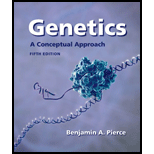
To determine:
The thrifty
Concept Introduction:
Epigenetics is the branch of genetics in which heritable alterations in gene expression is studied. In epigenetics only those genes are studied that do not modify the underlying DNA sequences. In other words Epigenetics is the branch that studies heritable phenotype variations that do not affect or change the DNA.
Explanation of Solution
Thrifty genes: These types of genes enable individuals to efficiently collect and process food to deposit fat during at the time of fat abundance.
Thrifty gene hypothesis says that population whose ancestral surroundings were marked by times of feast and famine underwent positive selection for thrifty genes. Thrifty genes hypothesis is based on the presumption that knowledge about the parental situation may be useful for the offspring.
This hypothesis says that when environmental conditions are bad for the parents, then the offspring will face the same problem. Therefore, when the parent encounters difficult times, natural selection promotes parents that produce
To determine:
The long-term effects of diet that were observed among the residents of Overkalix because of thrifty hypothesis.
Explanation of Solution
The residents of Overkalix were suffering from the problem of fast and famine (scarcity of food) for a long time. In this person who underwent the problem of famine in their adolescence affected the future health of their offspring. Researchers found that at the time of famine people are dying because of cardiovascular diseases and diabetes.
Researchers then followed down the parents and grandparents to learn the availability of food, when they were children, researchers observed the relationship between parent and grandparent and descendant diet. Researchers found that after suffering from the problem of famine the individual start producing the thrifty offspring. When thrifty descendants were raised at the time of food abundance their thrifty phenotype leads to obesity, heart disorders, and diabetes.
Thrifty genes are the genes that do not affect the sequence of DNA. This hypothesis says that parents and offspring diets are related. Parental condition will predict the future of their offspring.
Want to see more full solutions like this?
Chapter 21 Solutions
Genetics
 Human Anatomy & Physiology (11th Edition)BiologyISBN:9780134580999Author:Elaine N. Marieb, Katja N. HoehnPublisher:PEARSON
Human Anatomy & Physiology (11th Edition)BiologyISBN:9780134580999Author:Elaine N. Marieb, Katja N. HoehnPublisher:PEARSON Biology 2eBiologyISBN:9781947172517Author:Matthew Douglas, Jung Choi, Mary Ann ClarkPublisher:OpenStax
Biology 2eBiologyISBN:9781947172517Author:Matthew Douglas, Jung Choi, Mary Ann ClarkPublisher:OpenStax Anatomy & PhysiologyBiologyISBN:9781259398629Author:McKinley, Michael P., O'loughlin, Valerie Dean, Bidle, Theresa StouterPublisher:Mcgraw Hill Education,
Anatomy & PhysiologyBiologyISBN:9781259398629Author:McKinley, Michael P., O'loughlin, Valerie Dean, Bidle, Theresa StouterPublisher:Mcgraw Hill Education, Molecular Biology of the Cell (Sixth Edition)BiologyISBN:9780815344322Author:Bruce Alberts, Alexander D. Johnson, Julian Lewis, David Morgan, Martin Raff, Keith Roberts, Peter WalterPublisher:W. W. Norton & Company
Molecular Biology of the Cell (Sixth Edition)BiologyISBN:9780815344322Author:Bruce Alberts, Alexander D. Johnson, Julian Lewis, David Morgan, Martin Raff, Keith Roberts, Peter WalterPublisher:W. W. Norton & Company Laboratory Manual For Human Anatomy & PhysiologyBiologyISBN:9781260159363Author:Martin, Terry R., Prentice-craver, CynthiaPublisher:McGraw-Hill Publishing Co.
Laboratory Manual For Human Anatomy & PhysiologyBiologyISBN:9781260159363Author:Martin, Terry R., Prentice-craver, CynthiaPublisher:McGraw-Hill Publishing Co. Inquiry Into Life (16th Edition)BiologyISBN:9781260231700Author:Sylvia S. Mader, Michael WindelspechtPublisher:McGraw Hill Education
Inquiry Into Life (16th Edition)BiologyISBN:9781260231700Author:Sylvia S. Mader, Michael WindelspechtPublisher:McGraw Hill Education





